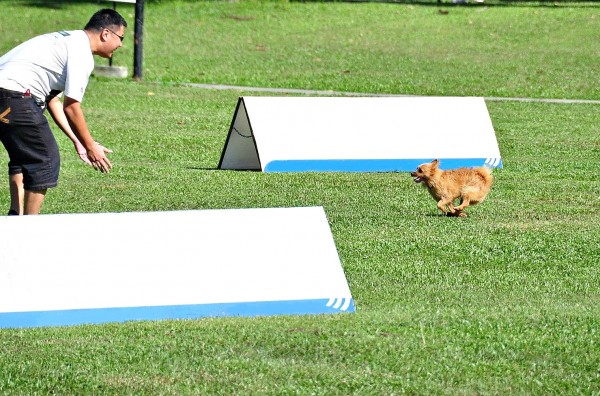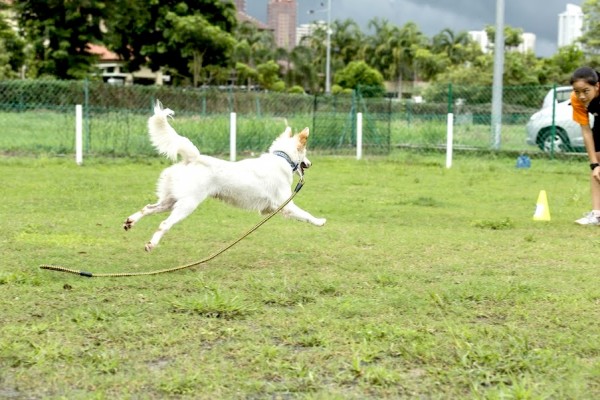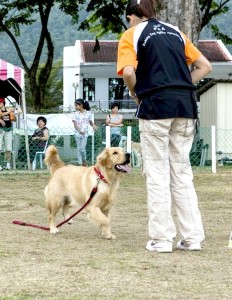Harness The Power Of Praise For Control
| Tweet |
We all know human beings are prone to forgetfulness. Compounded by the fact that man-made items do not last forever, accidents are bound to happen. While rushing to work in the morning, we might forget to close the gate or while walking our dog, the leash or collar might snap and before we know it, we have an animal on the loose.
The consequence of having a dog run away and refusing to come back can be bad. It might get run over, get lost, the dog-catchers might get it, or — if the animal has never been socialised and is disoriented and fearful of unfamiliar surroundings and faces — it might react aggressively.
And then what? Will we have another case of canine bad press on our hands?

Rick and Terrier-mix Hachi show how Recall is done. Hachi was a stray rescued by Rick who enrolled him into Obedience classes to show that non-pedigrees, at any age, can be taught to respond to commands - Pic by Rick Low
Preparedness on our part and priming our pet in the event of such situations come to mind, and — whether we like to hear it or not — the solution is training.
The word “training” has a bad rap because people often knock things they do not understand or think spending effort, time and money on such an exercise is “unnecessary”. These notions are so wrong because training, or learning to communicate with your pet, can save both you and your dog a whole lot of headaches later on. Let me illustrate.
A friend of mine — a long-time dissenter of training and a senior citizen whom we shall call Tan — recounted the story of how a snapped leash lead him on the road to training his dog.
Walking his pet around the neighbourhood late one night, the leash suddenly broke and before the old man could gather his wits about him, the dog darted away into the darkness.
To say Tan was frantic is an understatement. He gave chase. He called out. But instead of returning to its master, the dog ran further afield, disappearing into the bushes, reappearing for a second but only to slip into a back alley behind darkened houses.
Tan was utterly dismayed. Now he had to contend with an obstacle race of sidestepping open drains and hurdling over backyard junk in the dark.
For a full half hour, the dog played hide-and-seek with its sweaty owner hot on its heels. But finally, after running itself out of steam, it decided to return. The old man was so relieved he did not admonish the dog but gushed praises and affection on it instead.

Another mongrel named Oddey showing bounding joy when called to Come is Oddey, trained by 13-year-old Carmelia Yew - Pic by Sue Yeap
Unbeknownst to him at the time, Tan had stumbled on to the first step of dog behaviour modification, or the science of dog training.
The next evening, determined not to see a repeat of last night’s misadventure, Tan took his dog out for an experiment. At a secluded spot, he deliberately released it. The dog ran off but this time, when he called, the dog returned immediately and Tan lavished it with praise and unbridled head rubs.
Through the owner’s actions, the dog was beginning to learn a behaviour due to the affirmative response he was receiving. In canine training-speak, this exercise is called Recall and the method behind it is described as positive reinforcement.

Positive reinforcement uses praise or treats to reward behaviours that are desirable, sending a clear message to the animal that it is doing the right thing. In the absence of treats, the power of praise alone produces a similar outcome.
Management gurus at the workplace or teachers in schools will expound the concept that praise is an effective motivational tool to increase performance. Dog psychology works on the same principle.
Because dogs crave praise as much as humans do, teaching a dog becomes a cinch once we know how to press the right buttons.
And that is why Tan walks with a spring in his step these days. He no longer fears the prospect of a runaway dog because he knows, by harnessing the power of praise for control, his beloved pet will always come when called.
| Tweet |

Facebook Comments